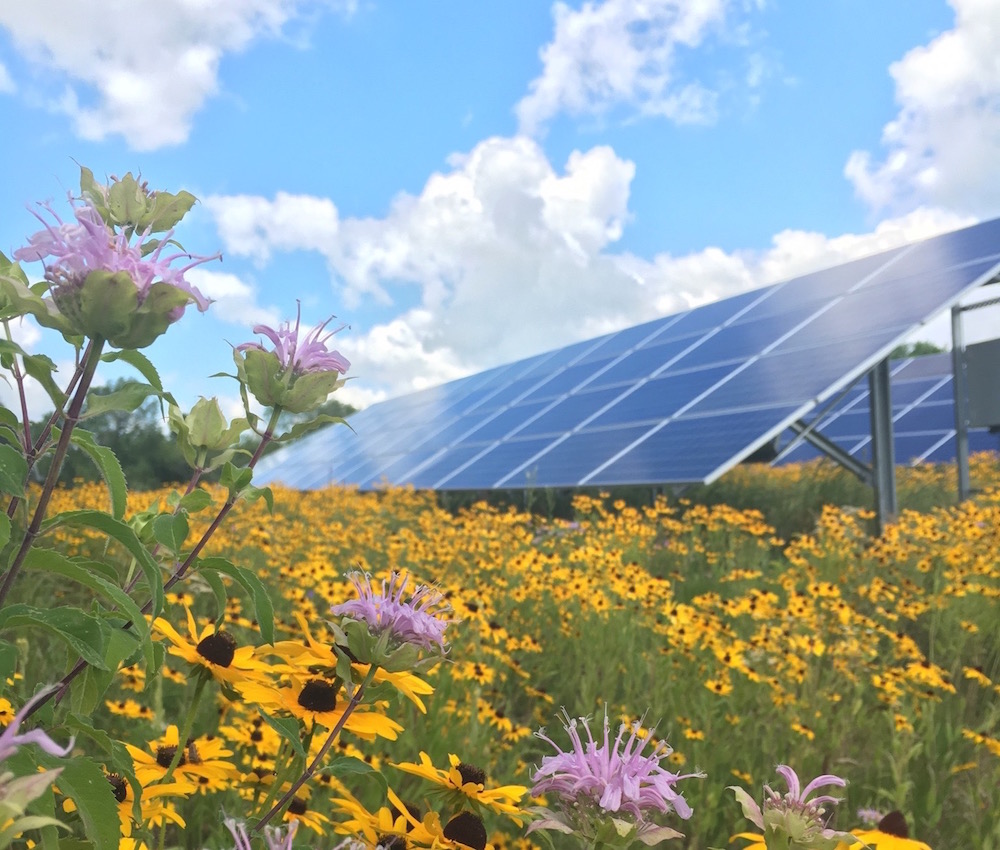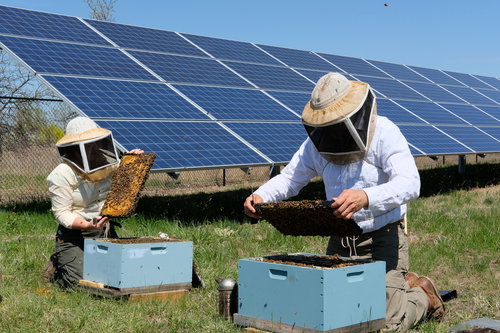Solar Power and Honey Bees Make a Sweet Combo in Minnesota
In Minnesota, solar power and pollinators come together in a sweet combination.
Solar Power and Honey Bees Make a Sweet Combo in Minnesota
In Minnesota, solar power and pollinators come together in a sweet combination.

On May 31, 2016, Minnesota Gov. Mark Dayton signed the Pollinator Friendly Solar Act into law, a first of its kind legislation that lays out voluntary standards for managing native habitat – think prairie grass and wild flowers – for pollinators, songbirds, and other beneficial critters. Solar developers and local governments can use these guidelines, which give recommendations on things like what seed mixes to use, the best options for laying out the plants, and how to maintain the site, in order to help provide these beneficial creatures with the a comfortable home. In return, they get bragging rights, so long as they can prove they’re following state regulations. They also have to make their site’s vegetation plan available to the public, among other requirements. The idea is catching fire among solar providers through Minnesota.
Pollinators, as we’ve reported, are facing habitat loss at an alarming rate, due to things like development, logging and mono-cropping. Between 2015 and 2016 alone, the USDA reported a 44 percent decline in U.S. honey bee colonies. Bees play in outsized role in food production, too, pollinating approximately 75 percent of fruits, nuts, and vegetables grown in the U.S.
Connexus Energy, the largest customer-owned power company in Minnesota – they serve about 130,000 customers in the eastern part of the state who buy shares so they don’t have to install and maintain solar panels at their homes – initially incorporated pollinator habitat at its 1.2 acre solar array site, called SolarWise garden, in Ramsey, Minn., soon after the law’s passage. This past April, they took it a step further and installed bee hives.
The company partnered with local beekeepers Bolton Bees on the project, which is the first U.S. solar facility to host a commercial bee operation. Since then, two more, much larger (about 40 acres each), solar array sites from different companies have brought in apiaries, according to Rob Davis from Fresh Energy, an environmental consultancy in St. Paul. “Altogether the three sites provide pollinator habitat equivalent to more than 40,000 homes each having a 6 by 12 pollinator garden,” he tells Modern Farmer in an email.

Travis and Chiara Bolton, the owners of Bolton Bees in St. Paul, have recently begun their first honey harvest from the three sites and have already extracted 3,600 pounds of what they call “Solar Honey” – honey that’s produced on or around solar array sites – and will be extracting the final 20 frames in October at a special event at the SolarWise garden. Most of the honey will be sold at grocery stores, but a portion will be given to solar garden subscribers or donated to local community fundraising events.
Besides the sites in Minnesota, Bolton Bees is in talks to have apiaries at solar sites in Wisconsin, Iowa, and Illinois. The couple is also promoting the idea of producing marketable honey to other commercial beekeepers in hopes of establishing an industry standard for the practice. They’ve trademarked the name “Solar Honey” and license it to other beekeepers, food producers, and energy companies that agree to follow certain production standards. “We hope that this model can be replicated throughout the nation,” says Travis Bolton.
SaveSave
Follow us
This work is licensed under a Creative Commons Attribution-NoDerivatives 4.0 International License.
Want to republish a Modern Farmer story?
We are happy for Modern Farmer stories to be shared, and encourage you to republish our articles for your audience. When doing so, we ask that you follow these guidelines:
Please credit us and our writers
For the author byline, please use “Author Name, Modern Farmer.” At the top of our stories, if on the web, please include this text and link: “This story was originally published by Modern Farmer.”
Please make sure to include a link back to either our home page or the article URL.
At the bottom of the story, please include the following text:
“Modern Farmer is a nonprofit initiative dedicated to raising awareness and catalyzing action at the intersection of food, agriculture, and society. Read more at <link>Modern Farmer</link>.”
Use our widget
We’d like to be able to track our stories, so we ask that if you republish our content, you do so using our widget (located on the left hand side of the article). The HTML code has a built-in tracker that tells us the data and domain where the story was published, as well as view counts.
Check the image requirements
It’s your responsibility to confirm you're licensed to republish images in our articles. Some images, such as those from commercial providers, don't allow their images to be republished without permission or payment. Copyright terms are generally listed in the image caption and attribution. You are welcome to omit our images or substitute with your own. Charts and interactive graphics follow the same rules.
Don’t change too much. Or, ask us first.
Articles must be republished in their entirety. It’s okay to change references to time (“today” to “yesterday”) or location (“Iowa City, IA” to “here”). But please keep everything else the same.
If you feel strongly that a more material edit needs to be made, get in touch with us at [email protected]. We’re happy to discuss it with the original author, but we must have prior approval for changes before publication.
Special cases
Extracts. You may run the first few lines or paragraphs of the article and then say: “Read the full article at Modern Farmer” with a link back to the original article.
Quotes. You may quote authors provided you include a link back to the article URL.
Translations. These require writer approval. To inquire about translation of a Modern Farmer article, contact us at [email protected]
Signed consent / copyright release forms. These are not required, provided you are following these guidelines.
Print. Articles can be republished in print under these same rules, with the exception that you do not need to include the links.
Tag us
When sharing the story on social media, please tag us using the following: - Twitter (@ModFarm) - Facebook (@ModernFarmerMedia) - Instagram (@modfarm)
Use our content respectfully
Modern Farmer is a nonprofit and as such we share our content for free and in good faith in order to reach new audiences. Respectfully,
No selling ads against our stories. It’s okay to put our stories on pages with ads.
Don’t republish our material wholesale, or automatically; you need to select stories to be republished individually.
You have no rights to sell, license, syndicate, or otherwise represent yourself as the authorized owner of our material to any third parties. This means that you cannot actively publish or submit our work for syndication to third party platforms or apps like Apple News or Google News. We understand that publishers cannot fully control when certain third parties automatically summarize or crawl content from publishers’ own sites.
Keep in touch
We want to hear from you if you love Modern Farmer content, have a collaboration idea, or anything else to share. As a nonprofit outlet, we work in service of our community and are always open to comments, feedback, and ideas. Contact us at [email protected].by Andrew Amelinckx, Modern Farmer
September 1, 2017
Modern Farmer Weekly
Solutions Hub
Innovations, ideas and inspiration. Actionable solutions for a resilient food system.
ExploreExplore other topics
Share With Us
We want to hear from Modern Farmer readers who have thoughtful commentary, actionable solutions, or helpful ideas to share.
SubmitNecessary cookies are absolutely essential for the website to function properly. This category only includes cookies that ensures basic functionalities and security features of the website. These cookies do not store any personal information.
Any cookies that may not be particularly necessary for the website to function and are used specifically to collect user personal data via analytics, ads, other embedded contents are termed as non-necessary cookies.